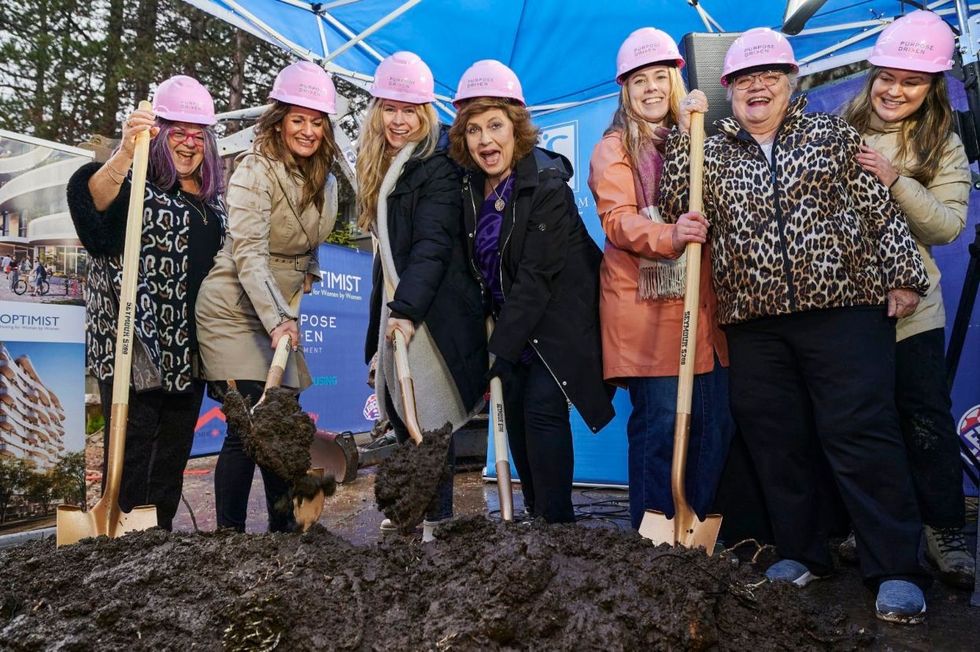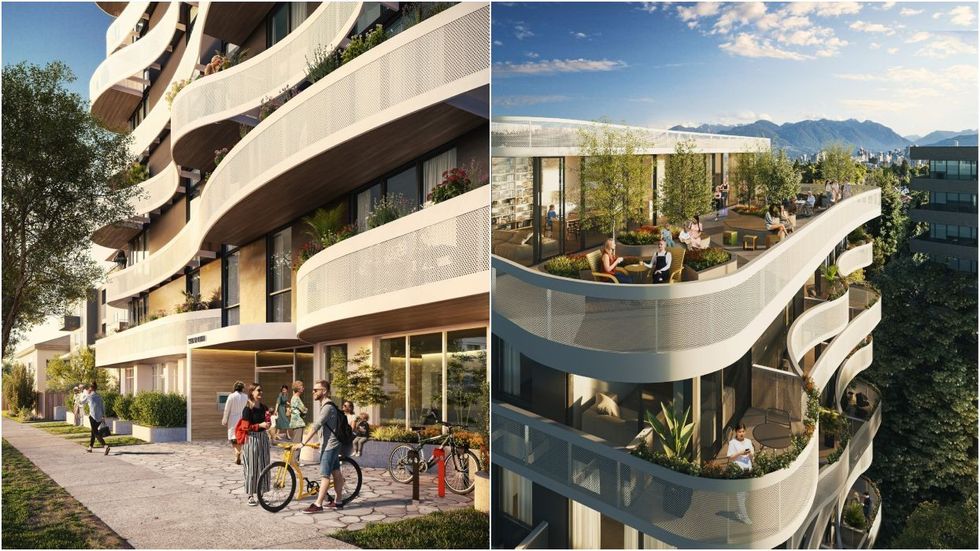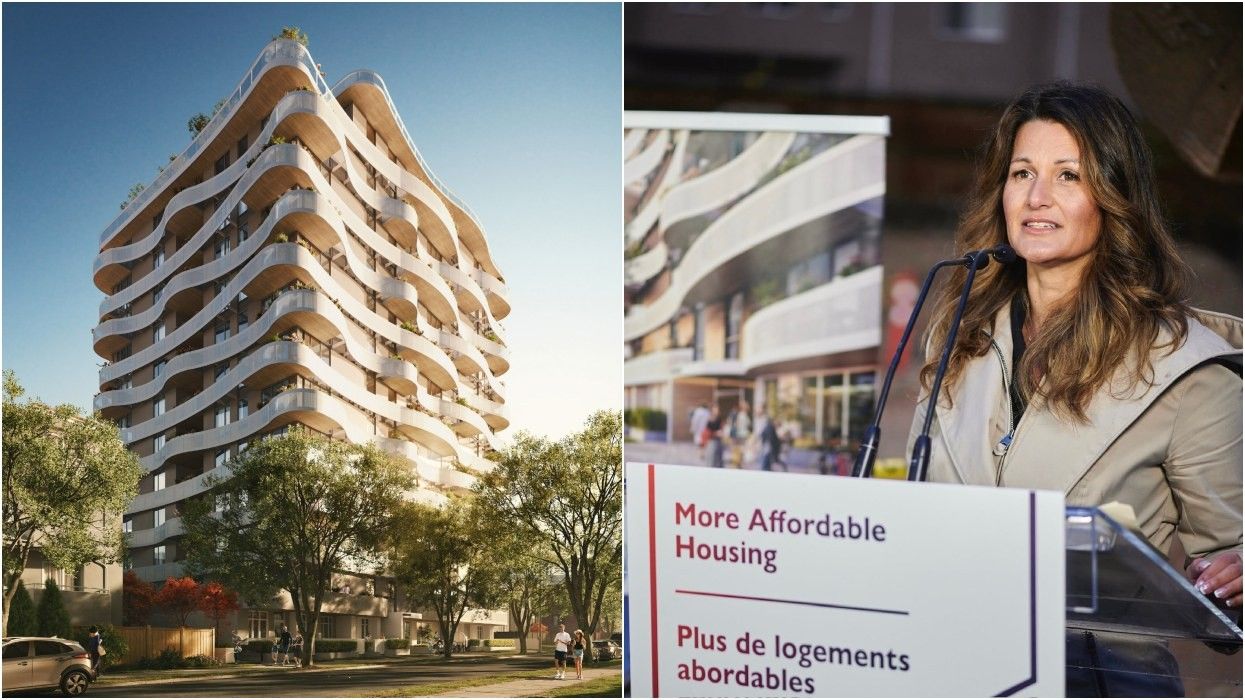Last week, Vancouver-based Purpose Driven Development broke ground on a project that's been in the works for a few years: a 13-storey building with 135 units that will replace the existing 21 units at 550 W 13th Avenue in Vancouver.
The project is a partnership between Purpose Driven Development and Soroptimist International of Vancouver, who will own the project, which received funding from the City of Vancouver, the Province of British Columbia, as well as the Government of Canada, and construction on the project is expected to be completed in 2026.
The most notable aspect of the project, however, and a big reason why it and the team behind it has received recognition from across North America, is that it is a housing project for women that's being delivered by an all-woman team.
In an interview with STOREYS, Founder and CEO of Purpose Driven Development Carla Guerrera discusses how that came to be, how that changes the experience of developing a project, and what she thinks the real estate sector needs to do in order to usher in more change for women.
This project is going to be an affordable housing project for women and women-led families. Can you tell me about the significance of that and why we need more women-centric housing?
The project is mixed-income and it's focused on women — senior women, women-led families, and workforce women. The project is a partnership between my firm and the non-profit Soroptimist International of Vancouver, and their focus as a non-profit is to improve the lives of women and girls. We are a women-owned, operated, and led development company, and so when we bring those two missions, visions, and experiences together, we ended up with the mandate of this project, which is to deliver a housing project for women, by an all-woman team.
Women, as we know, experience pretty significant — across the board — economic inequality, everything from the gender-based wage gap we see across every sector to women being over-represented in low wage and service-based work. And so when you pair that economic inequality with living in a city like Vancouver that has an astronomical housing crisis, you end up with a situation where women are disproportionately impacted in their ability to access housing that is affordable to them and their families.
Yet, there are very few projects that are delivered that are focused on and/or targeting women in order to bring more equality. That's really the "why" behind the project. We wanted to bring a project to life with this vision of helping to solve that disparity that women face, but we also wanted to do it by elevating the leadership of women across the building and development sector, where women are very under-represented, so we decided to deliver this project with an all-woman team.

How big is this all-woman team?
We certainly know it's not possible to have all women on the side of trades. That just doesn't exist. But we did succeed in having an all-woman team from the land surveyors, to the architects, to the engineers, and every professional on this team has been a highly qualified woman. We've had a team delivering this project over the last four years that consists of about 25 highly qualified professional women, who have been working together collaboratively to get this project to the point of construction.
It's been pretty exciting. It's every consultant on the team. My firm has been leading it as the development lead, and we're a team of women, but it's every consultant. The land surveyor, the architects, the engineers, the landscape architects, the estimators. Every single hire that we've made across the consultant team.
We know for sure it's the first of its kind in Canada — that's delivering housing for women and by women — but we think it's also the first of its kind in North America, possibly. We've received global awards for assembling this all-woman team and we've also received a lot of recognition from the US State Department, and we've spoken at a number of their events and conferences about this project.
Can you tell me about the "gender-based look" the team took to this particular project? What does that look like in practice? Are there aspects of that which show up in the project itself?
It's certainly in the approach, working very collaboratively and as a team. One of the big successes of this project is that we got this project approved through rezoning in seven-and-a-half months. No one on the project team had ever experienced a rezoning that fast, with that much collaboration from the City. None of us. Twenty-five people. So I think in terms of how that gender-based approach shows up, I think it shows up in our leadership and how we led this project.
Second of all, I would say it shows up in the design. You can see from the architecture, it's quite beautiful. It's quite intentionally very soft and organic in its shape and its curves, and that's kind of meant to be a more organic and feminine feel to the architecture that our architect, Amela Brudar from GBL, brought.
And I would say the other part of the project that is reflective is our program. The building will have a lot of spaces for social connection that are woven, intentionally, throughout the building. You come into the building, for instance, and there's a very large lobby, and we designed the lobby to be quite big, with a large company sofa in the middle of it which acts as a large living room space for the entire building, where [for example] senior women — who we know really struggle with social isolation — can come into the building or go down to the lobby and there can be some time and space for that social interaction.
This building will actually also have quite beautiful sweeping views from the rooftop and, normally, those would be saved for the most expensive rents on the highest revenue-generating units, but instead of being profit-driven, we turned that space into social space for the whole building. We created a rooftop terrace that has coworking space and a yoga studio and a meditation room and an indoor space that can be used for social functions.

How did your firm get to the point of having an all-woman team? Or was it like that from the beginning?
I founded Purpose Driven in 2016, after spending over two decades working in the delivery of housing — mostly in the private sector. I was delivering over a $1B in mixed-use real estate development with many of the top developers in Canada, and I never actually had a female boss while working in those companies. It was always an all-male leadership team, mostly all-male boards, and very few women represented in leadership. I was often one of the only women at the leadership table.
Then I had a family, I had two children, and just found that environment of working with all male colleagues and all-male leadership to be very isolating, and it became increasingly difficult as a mother to work in a company like that — not family-friendly, not friendly for women especially who are trying to balance their careers and have children. It was a very kind of stifling environment, so I left, I decided to start my own company and bring that experience to not only being a female-founded company, to create a different kind of work culture, but also to do work that was really focused on delivering triple-bottom-line development, where we're delivering on social benefits, we're helping to solve the housing crisis, while also delivering projects that are financially viable.
Once Purpose Driven was off the ground, there were just a ton of women that were working in the private sector that came to me to say 'I love what you're doing and I'm sick of working in these all-male environments and just always optimizing profit, I want to work with a purpose-driven company and bring my skills and expertise to a work environment that has more female leadership and do good in the world.' A lot of those people have kind of continued to come forward and wanted to be part of what we're doing, whether it's as an employee of my company, or a contractor, or a consultant. We're really growing rapidly and expanding rapidly right now.
What do you think we lose by not having more women in the development industry?
I think people will go or be attracted to places where they see themselves represented. Women are grossly under-represented when we look at who is leading these real estate development companies, or even in construction, on boards, and in leadership. And so if we don't have women at that leadership level, if it's all dominated by men, we're going to continue to see just men grow into those roles, or groomed to grow into those roles. I think that's a major challenge and loss to not have more women leaders to inspire other women to grow into those kinds of positions.
Also, without women around the leadership table, you're not getting the perspective that women bring. What we've noticed on this project is that it's a completely different experience when you're around a table of professionals that bring a more collaborative approach. Ego is checked at the door. That's what our experience has been on this project and in our company. There is no ego and it's extremely collaborative. We're really focused on growth, we're really focused on elevating each other, and I would say, culturally, within my company, that is something that my team members will repeat time and time again — that has been their experience of how this is so different.
Women bring a different lens, we bring a different perspective, we oftentimes bring different approaches or skillsets to leadership and our leadership style than what is typically represented in the sector. And when you don't have women at the leadership table of companies and of boards, then you just end up getting more of the same, you just perpetuate the same ways of doing things, the same kind of values, the same kind of problem-solving approaches, so nothing ever changes.
Do you think this has improved at all?
I think if you look quantitatively and you look at the experience of women in terms of women represented in leadership and the gender-based wage gap, I actually think it hasn't gotten better. I think if you look at the statistics and studies across the real estate sector, at least what I've seen in recent years, is that it's either stayed the same or, if anything, gotten worse, from a quantitative perspective. That's really disheartening. I know CREW has done some studies.
[A 2020 CREW report found that women occupy 36.7% of the commercial real estate industry and that this percentage has not changed much in 15 years. It also concluded that women continue to earn less than men, with a salary gap of 10.2% and a commission and bonus gap of 55.9%, and that women still hold just 9% of C-Suite positions.]
We're on a big growth trajectory, so we're really looking to work with and collaborate with other aligned companies and organizations and to lead a lot more development projects so that can we showcase the leadership of women. It's exciting and we're just getting started.
- The Winners Of The 2023 CREW Vancouver Leadership Awards ›
- CEO Katie Maslechko On The Launch Of BC's Rental Protection Fund ›
- AY Vancouver’s Managing Director Jessica Toppazzini On Her Entryway Into CRE ›
- Gryphon Development Founder Jason Hsu On Bringing Taiwan To Vancouver ›
- Britainny Hari On Launching Dual Agency And The CRE World For Women ›
- Multi-Tower Project With 847 Social Housing Units Proposed For South Vancouver ›





















